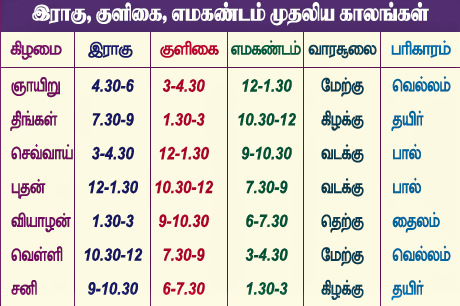| Day | Rahu Kaalam |
| Tuesday | 3 to 4.30 PM |
Our Ancestors would look for the timings before starting any activity . Hence they regularly check Rahu kaalam Timings and avoid these timings to the extent possible. When they are going out of home for any work or outstation, they avoid rahu kaalam
Our Ancestors derived above timings and followed for hundreds of years with great belief. As per them, its advisable to avoid these timings for carrying out any auspicious activity.
Rahukaalam is also known as Rahu Kaal or Rahu Kaalam, is a period of time considered inauspicious in Hindu astrology. It is a specific time frame each day that is associated with the planet Rahu, one of the nine celestial bodies (Navagrahas) in Hindu astrology.
Rahu Kaalam Timings Today/ Today Rahu Kaalam Timings:
| Day | Rahu kaalam |
| Sunday | 4.30 to 6 PM |
| Monday | 7.30 to 9.00 AM |
| Tuesday | 3 to 4.30 PM |
| Wednesday | 12 Noon to 1.30 PM |
| Thursday | 1.30 to 3 PM |
| Friday | 10.30 to 12 Noon |
| Saturday | 9 to 10.30 AM |
Rahu kaalam
Rahu kaalam is the particular time of the day which is considered to be under the control of Rahu. When Moon moves from South to North in its orbit and crosses Sun’s path – the incision point is called Rahu or Dragon’s Head The time of day considered to be under the influence of Rahu is called Rahu kalaam and is considered inauspicious.
- Duration: Rahu kaalam is approximately one and a half hours in duration and occurs every day. The timing of Rahu kaalam varies depending on the planetary calculations, sunrise, and sunset times, and it is different for each day of the week.
- Inauspiciousness: According to Hindu beliefs, Rahu kaalam is considered inauspicious for starting new ventures, important tasks, or making significant decisions. It is believed that activities initiated during Rahu kaalam may face obstacles, delays, or unfavorable outcomes.
- Calculation: The timing of Rahu kaalam is calculated based on the length of the daytime, which is divided into eight equal parts. Rahu kaalam is assigned to the eighth part of the day, starting from sunrise and ending before sunset. The exact timing may vary based on the specific planetary positions and geographical location.
- Days of the Week: Each day of the week has a specific period assigned as Rahu kaalam.
- Precautions: Many people avoid initiating important activities during Rahu kaalam to minimize potential negative influences. Instead, they choose an auspicious time such as Muhurat (an auspicious period) for commencing significant events.
- Significance: Rahu kaalam is derived from Hindu astrology and is based on the belief that the planet Rahu has a negative influence during certain periods of the day. Rahu is considered a malefic planet associated with obstacles, delays, and challenges.
- Auspicious and Inauspicious Activities: During Rahu kaalam, it is believed that starting new ventures, making important decisions, or conducting auspicious ceremonies may lead to unfavorable outcomes. Hence, people try to avoid undertaking such activities during this period.
- Exceptions: There are certain exceptions to Rahu kaalam. For example, if an activity is of utmost importance or urgency, some individuals may choose to proceed with it during Rahu kaalam despite the belief in its inauspiciousness. Additionally, Rahu kaalam is not considered inauspicious for activities that are associated with the worship of Lord Rahu or practices specifically dedicated to nullifying its negative effects.
- Belief in Other Inauspicious Periods: In addition to Rahu kaalam, Hindu astrology recognizes other inauspicious periods such as Yamagandam and Gulikai Kaal. These timeframes are associated with different planets and have their own specific durations. Similar precautions and beliefs are followed during these periods as well.
- It’s important to note that the belief and adherence to Rahu kaalam may vary among individuals and communities. While some people strictly avoid undertaking important activities during this time, others may consider it as a matter of personal belief or tradition.
Rahukaalam yamagandam kuligai timings today:
